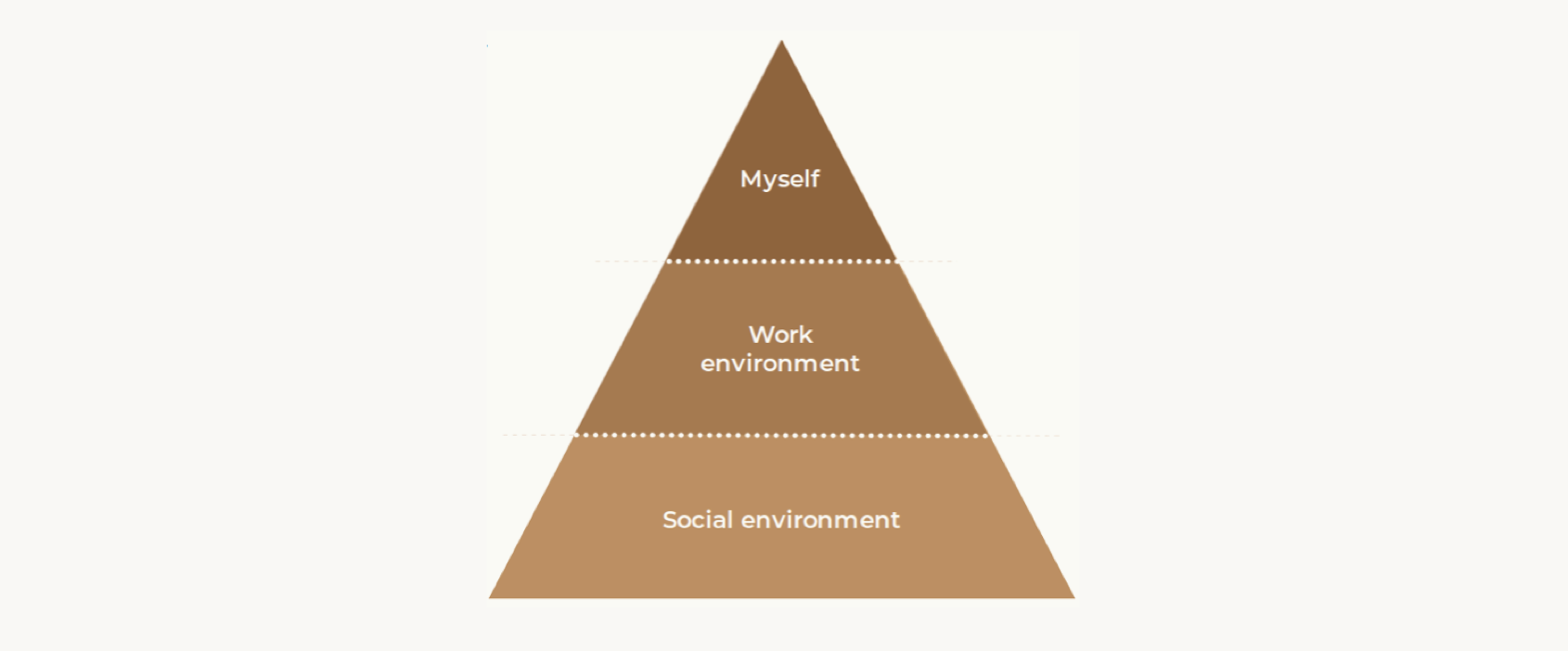Energy Banking – Are Your Investments Providing Good Returns?

Our approach to mental energy is very simple: it describes the capacity we have for managing our life and environment. In finance terms, try thinking of it as energy banking. You invest your time and energy each day to various tasks, activities, and relationships.
Some of your investments will provide good returns and actually increase your energy levels. Others on the other hand, will drain you and deplete your energy stores. You can’t naturally eliminate all draining investments, but our goal is to help you in making wise investments that keep the balance of your energy banking positive.
To help you to evaluate and manage your energy balance we have developed the ‘Energy Pyramid’. This pyramid is divided into three parts. The top level focuses on ‘myself’, the middle level on work environment and the bottom on your social environment. Each of these levels has an impact on your mental energy and wellbeing and you should put effort into all of them, purposefully investing time and energy into right things.

Time for yourself – does it exist?
This layer of the pyramid often receives the lowest amount of time and energy investments, and often rightly so, as we are constantly dealing with other people. However, even the small investments into activities that you enjoy, can be hugely valuable and provide very significant positive returns.
Remember that the focus should not always be on doing something. An equally important, but sometimes more difficult, task is to occasionally do nothing. To be idle. Research is showing that when you rest, your brain is far from idle, and this mental processing during your downtime is very important for your health, wellbeing and performance.
As life gets busy with various commitments, remember to hold on to your ability to rest and recharge yourself with enjoyable activities, idle moments, and sufficient sleep. Pay attention also to your thinking patterns, as people easily get into negative spirals of worry and anxiety, which can consume their thoughts and drain their energy.
Are you surviving or thriving at work?
The second layer of the pyramid focuses on your work environment, and with most of us this eats up most of our time – and often even more of our energy. However, you should not see work as a necessary evil that you have to do in order to gain income, but rather as a way of using your abilities productively and learning new skills in order to serve others.
Researchers have identified three different approaches to work: seeing it as a job motivated by money, a career motivated by success, or a calling motivated by the work itself. They found that those who view their work as a calling, and are able to do work that is in line with their values, had the highest work and life satisfaction. The key factor was not really in the content of the work, but rather in the motivation and attitude towards it.
A second important element in your work environment is your ability to pace ourselves. Trying to push through each day with 100% effort from one task to the next is not sustainable as it is very draining, and it will actually not even lead to your best performance. You have to be deliberate in how you use your time and energy at work by paying attention to setting boundaries, taking mental and physical breaks, and also your diet choices.
Are you able to enjoy time with friends and family?
The final layer of the pyramid focuses on your social environment, which includes your family and friends. Social relationships are extremely important for people and research has shown their importance in connection with mental health, physical health, health habits, and even mortality risk. For example, adults who are more socially connected have been shown to be healthier and live longer than their more isolated peers.
What happens unfortunately often though, is that people deplete all their energy stores at work. They come home and are physically there, spending their time with family and friends, but mentally they may be so drained that they are not able to invest any energy to their relationships. With poor quality investments, you will also see poor returns and your relationships may suffer.
In order to manage your relationships effectively, we recommend you to first of all manage your daily energy levels in a balanced way. Secondly, invest time and energy to those people that mean the most to you, and be ready to sometimes limit your involvement with people that drain your energy.
Take a moment and fill in your energy pyramid
Bringing it all together, let’s take a final look at how well your actual investments are aligned with your priorities. Think what is really important for you in your life, and what are some of the key values that define who you are. Then evaluate whether your actual time and energy investments reflect your priorities and key values, or if your actions are actually showing something quite different.
How are you investing your energy?
Download your free Energy Pyramid template:
We all have 24 hours in each day and have time to do what is important for us. Learn to prioritise and schedule your most important activities and relationships first in your calendar. Avoid living constantly in a reactive mode – being consumed with urgent issues that come your way and unable to say no. Be purposeful with your life and take control of your investments, so that you can be proactive in how you manage your time and energy.
Finally, remember that investments by nature require something from you. If you want positive returns, you have to be willing to give something of yourself, and sometimes even take some risks.
Want to manage your energy levels better and achieve sustainable high performance? Leave your contact details below and we’ll be in touch with you.



